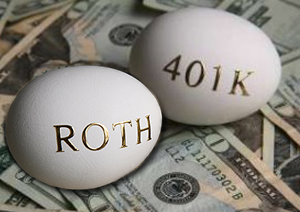 Employers have begun to broaden their retirement plan offerings by adding the option of a Roth 401(k) to their traditional plans.
Employers have begun to broaden their retirement plan offerings by adding the option of a Roth 401(k) to their traditional plans.
The Roth 401(k), first introduced in 2006, is finally beginning to catch on. According to the Vanguard investment management company, approximately 40 percent of 401(k) plans are now offering the Roth option, and more are expected in the future.
Have you considered whether the Roth 401(k) could be right for you? First, let’s begin with the mechanics. Like a Roth IRA, Roth 401(k) contributions are made with after-tax dollars so you do not receive an upfront tax deduction. Earnings can be taken out tax-free after you reach age 59½ and you have held the account for five years. While there are some similarities between the Roth 401(k) and the Roth IRA, there are a few differences to be aware of.
NO INCOME LIMITS
Roth 401(k) contribution limits follow traditional 401(k) limits — $17,000 for 2012 or $22,500 for those taking advantage of the catch-up provision available for people over age 50. This is much greater than the Roth IRA contribution limit of $5,000 or $6,000 including the catch-up contribution. In addition, the Roth 401(k) has no income limit. For savers already participating in a 401(k), Roth IRA eligibility phases out in 2012 between $110,000 and $125,000 for single filers and $173,000 to $183,000 for those who are married and file jointly. Other rules may apply, so speak to your tax adviser.
In addition, funds that remain in your Roth 401(k) until age 70½ are subject to required minimum distributions (RMD) while the Roth IRA is not. However, rolling your Roth 401(k) to a Roth IRA after retirement is an easy way to avoid having to take RMDs while continuing to take advantage of tax-free growth.
Finally, the Roth 401(k) and Roth IRA both excel in one area — as an estate planning tool. A person who inherits a Roth is able to spread the tax-free distributions over his or her lifetime.
ROTH vs. TRADITIONAL
Deciding between your traditional 401(k) and a Roth 401(k) is no easy task. Since choosing the Roth 401(k) means giving up the immediate tax deduction and less take-home pay for tax-free distributions during retirement, many savers have trouble determining if it is worthwhile. Roth 401(k) calculators that take into account your income, deferral rate, preretirement growth rate, postretirement growth rate, and retirement duration can help you determine which option may result in a larger after-tax retirement nest egg. Consider speaking to your adviser or visiting www.bankrate.com to access an online 401(k) and Roth contribution calculator.
Generally, for savers who expect to be in the same or higher tax bracket during retirement, the Roth 401(k) may be the way to go. Younger workers or those in lower tax brackets may benefit from this approach. While no one is sure where future tax rates are heading, pressure from budget deficits may lead to higher tax rates in the future.
TAX DIVERSIFICATION
In the same way that it may be helpful to diversify the holdings of your portfolio, utilizing a Roth 401(k) may be helpful in diversifying the tax treatment of your investments. Since tax laws are constantly evolving and changing, the ability to manage the tax implications of producing retirement income may help you in the future.
In addition, saving within a Roth 401(k) does not preclude you from also using the traditional 401(k) within the same plan. In fact, if you stay within the maximum contribution guidelines, you could split your funds between each type of 401(k) and hedge your bets on where your future tax rate may be. Keep in mind that if your employer offers a match, it will be with pretax dollars in a traditional 401(k) so you may end up with a traditional 401(k) and a Roth 401(k) regardless.
While the Roth 401(k) option is not for everyone, it is another tool that may help some savers leverage the tax-free growth offered to make the most of their retirement funds in the future. Since everyone’s situation is unique, speak to your tax adviser to determine if the Roth 401(k) should be part of your overall retirement plan.
Kurt J. Rossi, MBA, is a Certified Financial Planner Practitioner. He can be reached for questions at (732) 280-7550 or kurt.rossi@Independentwm.com. LPL Financial Member FINRA/SIPC.








